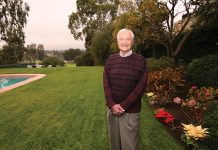From the time she was in high school and produced a riff on a CeeLo Green music video, was absolutely certain she wanted to work in a creative field.
Her parents weren’t so sure. “Producer” wasn’t on their radar as a secure profession. They required her to write a report about it so they could understand her prospects. Carey crushed it. Her highly detailed 10-page paper — complete with a full bibliography — earned their blessing.
After graduating from Belleville High School, Carey earned a bachelor’s degree in broadcast and cinematic arts from Central Michigan University, minoring in communications, with a focus on interpersonal communication, and in media production, design, and technology.
Working in Detroit post-graduation, she was the creative design producer for the HBO Max docuseries , a producer for the Netflix docuseries , and the producer for Pepsi’s “Full of Detroit Soul” campaign.
In 2021, Carey bet on herself and relocated to New York over Labor Day weekend. She immediately found work as a freelancer, focusing on film, television, documentaries, design, and commercials.
Her work since the move includes serving as creative design producer for the Netflix series and ; the Disney+ docuseries ; and the NBC/Peacock series . She also worked as the creative producer on a photoshoot campaign for intimate apparel brand Knix.
At time of writing, Carey is working on a new Netflix project, the name of which she can’t yet disclose.
How determined were you to pursue your dream?
My parents definitely wanted me to do something else. They didn’t know what the success rates for producers were. All through that paper, I was convincing myself. I see the benefit of that, and I’m glad they made me do it. They made me fight for something. They made me want it more.
What are your thoughts about the film industry?
We’re definitely seeing a lot of changes in the initiatives for the kind of stories being told, who’s telling those stories, and who’s on the team putting up those stories.
In 2016, changed the rules. Diversity is now at the top of people’s minds. I do appreciate that these initiatives are being taken, but they have a far way to go, especially for women.
For a recent commercial, my role was handling and hiring crew — the camera team, lighting team, etc. When I’m doing this, I consider what a crew looks like. Men? Women? People of color? I’m holding myself responsible.
I don’t take that lightly; it’s a power that can change our jobs. I’m pretty loud at making sure I’m speaking my truth. Time has taught me what sets should look like based on my experience.
How does your identity as a young woman of color in the industry inform your work?
I never felt excluded, but I have felt less heard. I’m only 28 now. Sometimes I’m still the youngest person on a project — and I’m the one leading it.
I’m also the only African American-South Korean person on set. I’m representing three different minority buckets. Until there are more like me on set, I will not be more heard.
How do people in the industry respond when they learn you’re from Detroit?
I’ve heard, “Oh, I bet you’re glad you moved out of there.” Or “Why would you ever have stayed in Detroit for as long as you did?”
I ask them why they think I’m glad I moved to New York. Some people assume Detroit has no film industry.
Moving out of Detroit made me realize how much pride I have in Detroit. They may think Detroit has nothing to do with having birthed my career, but I’m forever grateful for being from there. My love for Detroit is so big, but I didn’t realize how big until I left.
What drives you?
I’m a very type A person. Before I even knew all the roles producers take on and all their responsibilities, I knew I wanted to be a leader and oversee all the details of production.
I produce professionally, and my personal life is a producer role. I’m proud to have worked on shows that highlight someone’s truth. I like being part of the business and the creative process and making things happen. I’m the person who makes the creative come to life.
What’s ahead?
I’m now officially a member and can vote for Emmy Awards. That’s another kind of power I’m not going to take lightly. It’s the start of the change I’d like to see in diversity. I’m excited to bring something personal to this.
This story is from the June 2023Ěýissue of Â鶹·¬şĹ Detroit magazine. Read more in our digital edition.
|
| Ěý |
|








